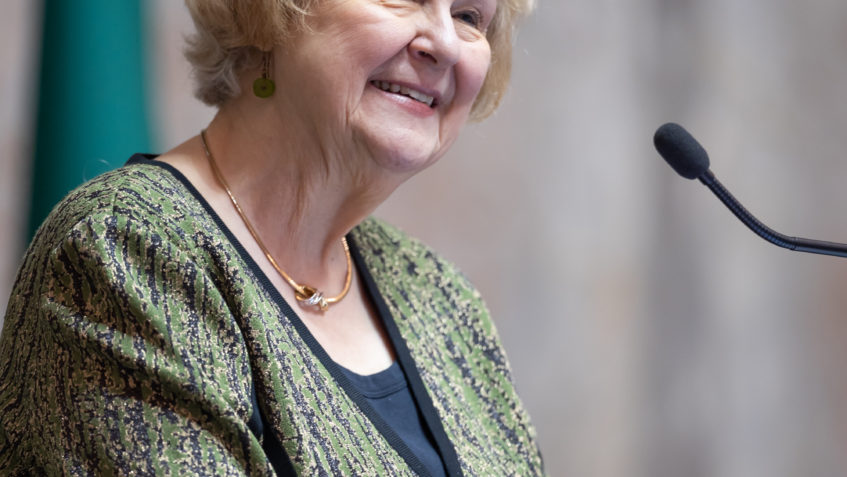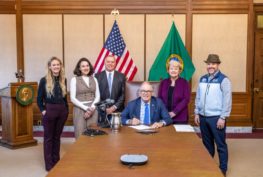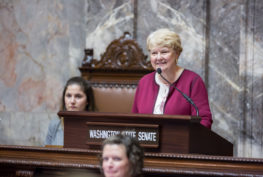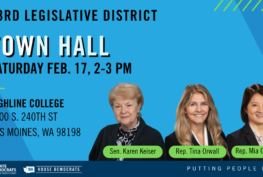Dear neighbors,
Some issues are controversial but simple. Others can be controversial because they are so complex. Many of the second type fall under the purview of the Labor & Commerce Committee, which I chair: alcohol, tobacco, cannabis, and other controlled substances. That part of our jurisdiction has sometimes been called the “vice” committee.
This year, the committee has heard testimony on several bills dealing with these issues, and we are working right now on incorporating the feedback from that testimony to make those bills stronger and better so we can pass them out of the committee. Here’s a glimpse into our process.
SB 5367, sponsored by Sen. June Robinson, would regulate novel cannabis products, called “cannabinoids,” that are currently not covered by our state’s regulatory system around marijuana. That has led to a situation where cannabinoid gummies are being sold in gas stations next to children’s candy.
When there are new developments in the market, it’s important that we update the regulations to maintain public trust and safety, while at the same time not damaging legitimate industries in our state, including the hemp industry, that use parts of the cannabis plant.
SB 5123, which I am sponsoring, would address the lingering effects of the war on drugs by prohibiting employers from discriminating against a person in hiring based on the use of cannabis outside work. This applies to pre-employment testing only.
Current cannabis tests cannot detect impairment, only exposure within the last couple weeks. This is an undue burden on people using a legal substance, especially if they are doing so for medical reasons. Federal employees and some other federally required sectors, including in airline and aerospace, would be exempt. This also doesn’t affect tests for other drugs. We are still working on fine-tuning what occupations would be subject to the legislation so that we can protect workers from discrimination while also keeping workplaces safe.
SB 5263, sponsored by Sen. Jesse Salomon, would legalize and regulate the supervised use of psilocybin by adults for wellness purposes. Some small clinical trials in recent years have shown that supervised psychedelic experiences can lead to dramatic improvements for patients with PTSD, depression, addiction, and other mental health disorders. Many of those studies have shown the benefits for combat veterans and people with the most difficult-to-treat issues that have not responded to medication and counseling. But our state’s Department of Health has grave reservations about the introduction of psilocybin without further review of health effects and establishing strict regulation. We know it’s important to get this right so that this new form of treatment can be used to help people who need it.
SB 5365, sponsored by Sen. Rebecca Saldaña, attempts to prevent children and young people from using tobacco without subjecting them to potentially dangerous interactions with the police. The bill increases penalties against retailers who sell tobacco to minors. And we are working on what penalties for minors in possession of tobacco would be appropriate to thread that needle.
SB 5291, sponsored by Sen. Mark Schoesler, would update how liquor licenses are granted and transferred. Current law mandates jumping through outdated hoops like notifying churches and schools by certified mail. That makes it hard for new cafes and bars to open, or for ones that are sold to stay open, especially when they are small businesses that have a hard time wading through red tape and enduring delays. We are working on just how that process should be modernized so that these local businesses can continue to thrive.
Highlight of the week: Washington State Quitline
Each week this session, I’ll highlight a resource that may be of use to you, your family, or your neighbors. I hope you’ll pass the information along to anyone who may be able to take advantage of it. This week, I want to let you know about the Washington State Quitline, which helps people stop using tobacco. Their number is 1-800-QUIT-NOW.
In 2000, the Legislature appropriated $100 million from a settlement with Big Tobacco to a statewide, evidence-based effort to help people quit smoking and prevent kids from starting in the first place. One of the keystones of that comprehensive approach is the Quitline, which first opened that same year.
Research had shown that free phone counseling is one of the most effective ways to help smokers kick the habit. Early efforts like Washington’s led to a national clearinghouse at 1-800-QUIT-NOW that routes calls to state quitlines. Since 2004, more than 310,000 calls have been received in Washington alone.
Previous highlights of the week: Dementia Road Map for Caregivers, Paid Family and Medical Leave, Healthy Starts Act pregnancy accommodations, Working Families Tax Credit.
Stay in Touch
Thank you to all the constituents and advocates who came to Olympia this week to make your voices heard. If you’d like to follow what I’m working on, you can like my official legislative Facebook page here.
Please don’t hesitate to stay in touch. Stay safe and take care.
Always,

Sen. Karen Keiser
Senate President Pro Tempore
Chair, Senate Labor & Commerce Committee




